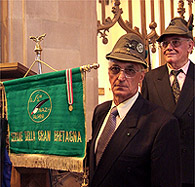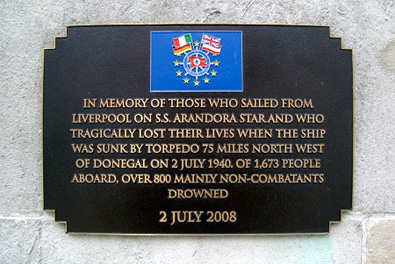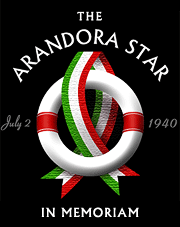 |
 |
The Arandora Star - Remembered At Last

In early June 1940, immediately Italy entered the Second World War, all male Italian passport holders between the ages of 18 and 70 years were arrested by the police and military - forcibly and hurriedly taken from their homes or their places of business - to be interned under instructions of the British War Cabinet.
As is shown from the Red Cross and other reports, these internees were maltreated by the authorities and were held in inhumane conditions, without proper food, sanitary facilities and medical care. Over 700 Italian internees were taken to Liverpool, where they were boarded the former luxury liner Arandora Star, along with over 450 German and Austrian internees and POWs, all destined for Newfoundland, Canada.
The ship had been painted grey and armed like a war vessel, and did not fly a Red Cross flag. On the morning of 2nd July 1940, off the coast of Ireland, the Arandora Star was torpedoed and sunk by a German U-47 submarine with the loss of over 800 souls on board.
The Forgotten Tragedy
For 68 years there had never been an official British commemoration of those who died. However with growing publicity of the tragedy both here and in Italy, and strengthening ties between the UK and Europe, officials from Liverpool Council and the Italian city of Palma met to discuss an official memorial to the victims on Liverpool waterfront.
The Parish Church of Our Lady and St Nicholas, Liverpool, was chosen to unveil the plaque in a remembrance service on 2nd July 2008, attended by war veterans, the Italian Ambassador and Archbishop Conti of Glasgow. This was followed by the scattering of Italian, German and British wreaths on the River Mersey in commemoration of those who died. Afterwards the plaque was relocated to its permanent position at the Pier Head, on Liverpool waterfront.
Although there has yet to be a full apology, perhaps due to issues regarding compensation, campaigns and committees both here and abroad have successfully raised awareness for the tragic events surrounding the Arandora Star. Recent memorials in England, Scotland and Wales have ensured that the Arandora Star, at one time the 'forgotten tragedy', will at last be remembered.

The plaque to the victims of the Arandora Star at the memorial service, parish Church of St.Nicholas, Liverpool
|
||

War veteran at the service
|

Former soldiers of the Italian Alpini Regiment
|
|

Boarding the ferry for the ceremonial laying of wreaths on the river
|
||

Archbishop
Conti
|

The priest prepares to bless the wreaths
|
|

The plaque in its permanent position opposite Mersey Docks and Harbour Board building on Liverpool's Pier Head waterfront
|
||
Further UK memorials
London

Church memorial, unveiled in 1960, over the entrance to St Peter's Italian Church, 136 Clerkenwell Rd, City of London.
Middlesbrough
Memorial unveiled by the Mayor of Middlesbrough in the Town Hall to 13
of the town's Italian victims, 2009.
Commemorative Plaque Middlesbrough
BBC
news article
Wales
On July 2nd 2010 Wales unveiled its memorial to the Arandora Star at St David's Catholic Metropolitan Cathedral, 38 Charles St, Cardiff.
Memorial
photos
Arandora
Star Memorial Fund For Wales Committee
Scotland
Also on 2 July 2010, a cloister garden was opened next to St Andrew's
Roman Catholic Cathedral in Glasgow which holds a memorial to the Arandora
Star.
The
Scotsman news article
The Scottish island of Colonsay unveiled a memorial on 2 July 2005, at
the cliff where the body of Giuseppe Delgrosso was found.
Colonsay
website

The Tragic Facts446 Italian males lost their lives.These men were civilians most of whom had made their homes in this country in the early 1900's. Many of the internees had sons and other relatives serving in the British Armed Forces. The internees had no rights whatsoever, and were denied even the basic rights allowed to prisoners under the Geneva Convention. Many were robbed of their valuables whilst in internment. Relatives of the internees were not advised what became of their husbands, brothers or fathers after their arrest in early June 1940. Under Government regulations families of many of the internees living in coastal areas were forced to leave their homes and seek refuge outwith main cities - wives and children with no home, no means of support, and no assistance whatsoever. Many internees were shipped overseas with their families being unaware of the fact and receiving no notification. The Arandora Star, on course to Canada, sailed without convoy, was grossly overloaded, and with no regard to the capacity of the ship's lifeboats. The Arandora Star put to sea with 80% of the crew newly signed on that morning. No emergency drill or instruction was given either to the crew, the military guards or to the internees. The ship had been overpainted in battleship grey and had the appearance of a troop carrier. It carried no Red Cross or other means of identification. All the lifeboats had been secured behind heavy wire mesh. The number of lifeboats being grossly inadequate, having been designed for the ship's maximum complement of only 500 passengers. The internees were harshly treated and held in overcrowded conditions. Many of the Italians, sleeping on the ballroom floor, being severely injured with breaking of the large mirrors when the torpedo struck. The survivors of the Arandora Star were again harshly treated when brought ashore and, despite their ordeal, many were put on board other ships for internment in Australia. No apology or compensation has ever been made to the Arandora Star victims. The American government, having interned many Japanese civilians during the war, subsequently made an apology to each and every one - and made a payment of compensation. As far as we can ascertain, no Japanese civilians suffered loss of life resulting from internment by the American authorities. |
All text and images (unless marked *) © Anthony Rea 2010 not to be used without permission. All rights reserved